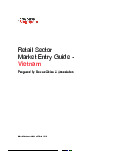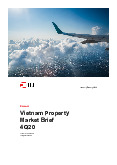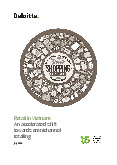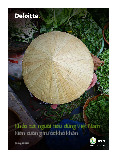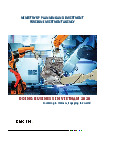



















Preview text:
Luxury hotels in Singapore: Study of
customer needs and preferences Global Immersion Project - Mid T erm Review Repo rt Mit Ladola (MS19CMM050) Priyam Kathotia (MS19CMM068) Akshay Vadhera (MS19CMM059) MGB September 2019 Introduction Global Overview of Luxury Hotel Indus try 1 Overview of Singapore’s Luxury Hotel in dustry 1 Luxury Hot els 2 T rends shaping Singapore's hotel landscape in 201 9 4 Scope 5 Literature Review PESTLE Analysis of Singapore 6 P orter’s F ive Fo rces Mo del 9 SWOT Analysis 11 Research Meth odology Problem St atement 18 Research Obje ctives 18 Research Desi gn 18 Sampling 19 References 1 Annexure I : Study Of Academic Jou rnals 2 2 Introduction Global Overview of Luxury Hotel Indu stry
The luxury hotel industry is one of the main customer service provider
industries globally. It is a growing travel and tourism industry. This is one of the
key reasons behind the boom of luxury hotel industry. In order to meet the
growing demand for special customer services, luxurious hotels are constantly
striving to enhance their services through focusing on altering customer preferences.
United States was once the biggest consumer market with a market share of
35.71% in 2013 and 32.05% in 2017 with a limit of 3.66%. China and EU
ranked the 2nd and 3rd markets with the market share of 18.58% and 17.28% in 2017.
Nowadays, the pinnacle five businesses make up greater than 26.37% market
share of the luxurious hotel market, and the world’s giant enterprises are
typically focused in North America. The top five companies are Marriott
International, Hilton, Hyatt Hotels, Four Seasons Holdings Inc. and Shangri-La
International Hotel Management Ltd.
Over the next five years the Luxury Hotels market will register a 2.6% CAGR
in phrases of revenue, the international market will reach US$ 208700 million
by 2024, from US$ 183500 million in 2019. (Wilson,2019) Overview of Singapore’ s Luxury Hotel indus try
Marina Bay Sands and Resorts World Sentosa expansion will definitely boost the sector.
The total existing hotel supply is expected to develop by means of 2% or an
extra 1,400 end of 2019, in accordance to a report by JLL. There are currently
over 68,000 hotel rooms in the city.
The tourism sector in the metropolis is anticipated to have a boost in the
medium to long term, given the expansion of Marina Bay Sands and Resorts
World Sentosa, the completion of an eco-tourism hub in Mandai by end of
2023, and the development of the Greater Southern Waterfront announced in
August that will include non-public and public accommodations, offices, leisure sights and resort.
The compound annual increase rate (CGR) for hotel supply is predicted to
sluggish to 0.7% from end-2019 to end-2022, from 4.2% at some point of end-2015 to end-2018. 1
The market-wide revenue per room (RevPAR) stayed at $186 in year-to-date
(YTD) July 2019, according to the Singapore Tourism Board (STB). Occupancy
reached 93.8%, the best ever recorded by STB.
RevPAR for upscale and midscale & economy hotels rose 1.2% during that
period, but luxury accommodations posted a 1.5% fall.
Transaction volume for motel investments in Singapore totalled $1.7b for YTD
September 2019. (HOTELS & TOURISM | Staff Reporter Singapore, 2019) Luxury Hot els
A hotel is a place that presents lodging paid on a temporary basis. Facilities
supplied may additionally range from a modest-quality mattress in a small room
to massive suites with bigger, higher quality beds, a dresser, a fridge and
different kitchen facilities, upholstered chairs, a flat screen television and en-
suite bathroom. Small, lower-priced hotels may additionally offer solely the
most basic visitor services and facilities. Larger, higher-priced accommodations
can also grant additional visitor amenities such as a swimming pool, enterprise
middle (with computers, printers and other office equipment), childcare,
convention and other facilities related to sports like tennis, basketball courts.
Also, restaurants, day spa and social function services are provided. Hotel
rooms are commonly numbered (or named in some smaller resorts and B&BS)
to permit guests to perceive their room. Some high-end hotels have custom
decorated rooms. Some hotels offer food as part of a room as well as board
arrangement. In the United Kingdom, a hotel is required by using regulation to
serve meals and drinks to all friends within stated hours. In Japan, hotels furnish
a tiny room appropriate only for snoozing and shared toilet facilities. The
hospitality sector generally accepts lodge star scores unique via Forbes
(formerly Mobil), and other critically minded organisations. But there are no set
requirements for "luxury hotels," and both four-star and five-star hotels
generally describe themselves as "luxury." Hotel friends paying high luxury-
hotel fees expect certain luxurious standards, in service, in rooms, in dining, and
in the whole lot else a desirable hotel offers. The luxury inn "musts" are normally as follows:
1. Easy, intelligent, respectful planning. The reservation procedure be simple,
and you should get all the assist you need. This must be whether you book: 2 • Directly with the hotel • Via its association
2. Fast, easy, discreet check-in & checkout. Nothing's more irritating than
waiting on a long check in line when you've got spent the day just getting to
the hotel. Luxury travellers hate to wait.
• Some hotels have taken a cue from the Apple Store, which has no check in
or checkout line, however roving salespeople who do it all on iPads.
• Your luggage must take no extra than 10 minutes to arrive in your room.
• A luxury hotel must provide video or express checkout, and rapidly settle
any discrepancies on your bill.
3. You get the room you wanted. The room you are assigned to have to be
precisely the kind of room you want. A true luxury resort will accommodate your request regarding • Room category or degree • Physical area in the hotel
4. Luxury hotel room features. The room features that must be existing for a
hotel to be viewed luxury. This covers most of them:
• A room that strikes you as stunning as soon as you walk in: With consistent
design, outstanding furnishings, and no inexpensive touches such as analysing lamps
• A quiet room not near the elevator nor generators and A/C gear
• A room with fresh air and no odours, such as historic smoke, mildew,
aggressive room freshener, or robust cleanser
• Real plaster (or adobe, stucco, wooden) walls • A king bed
• A fairly association mattress
• High-quality, all-cotton sheets and a natural-fibre bedspread
• A range of pillow kinds in the room or a smartphone call away • Robes and slippers
• At least one window you can virtually open
• Pleasant cloth window curtains, with a layer that block the light
• Adequate storage: Tabletop, counter, drawer, and closet area
• Enough hangers, and no longer the form connected to the rod
• An analysing chair chosen for comfort, not artiness • A desk or work surface • A room protected 3
• A good-size flat screen TV (not pivoting from the ceiling, hospital-style) • A coffee maker
• A full-length mirror, perhaps in the closet
• A fantastic and moderately quiet heating/AC system
• A (quiet) clock – and please, now not a vintage clock-radio
• Overall attention to aesthetic detail
• Free: Wi-Fi and bottled water T rends shaping Singapore's ho tel landscape in 201 9
With consumer life evolving rapidly, there is a need for the hospitality industry
to maintain tempo with new technologies to bring up the visitor experience.
From personalisation to seamless service and even the introduction of new
equipment like artificial intelligence and virtual/augmented reality, the hotel
industry is flawlessly poised to undertake a digital transformation. Hotels will
additionally want to seek out new approaches to enhance experiences via
offering intuitive offerings at some stage in the guest’s entire journey, from pre-
booking all the way through to the post-stay follow-up and feedback. Amidst
stiff opposition from non-traditional vacation hotel options, hotel providers
need to make certain that all client touch-points are first-class. Re-examining
their purchaser trip experience, especially on mobile platforms, and supplying
real nearby experiences will proceed to be key elements for hoteliers. When we
consider technological and operational upgrades, it is important that
accommodations address their back and front ends concurrently. Moving
forward, scale will proceed to matter, as large hotel organizations have
increased distribution power and negotiating power with OTAs. In a world with
a variety of brands and picks for consumers, having a strong loyalty programme
is imperative to interact with guests, entice repeat visits and drive greater
average spend. It is necessary that company is recognised for their endured
loyalty through offering them with tangible benefits and surprising perks that
motivate them to return to hotels time and again. Moreover, with Singapore
serving as a important business hub, it hosts several businesses and occasions
for the duration of the year. The essential needs of the MICE companies are
transferring drastically away from the typical convention settings. Hotels are
additionally recognising the demand for a one-stop-shop solution to grant work,
play and relaxation for visitors, and this style will only continue to grow in the
next half-decade. Hotels that can furnish differentiated experiences will be well-
positioned for the years ahead. With Singapore set to host 19 million site
visitors by 2021, there is an growing want to make sure that the nearby hotel
enterprise is geared up to accommodate this growth and be an eye-catching
“Smart Nation” vacation spot for tourists of this generation. Scope
This report has been prepared solely to provide the reader with an insight into
the Singapore hotel industry in terms of company strategies and key trends that
are emerging. The report investigates the leading hotel companies and analyses
their strategies. It then uses this information to identify the key trends in the
industry and how they will impact the industry moving forwards. This report is
not concerned with measures of financial or operating performance except in
circumstances where it explains a point. This report concentrates on the
strategies being used and trends occurring in the hotel industry at present. We
have seen a new global leader has been born, in the wake of Marriott
International’s takeover of Starwood Hotels & Resorts.
At the backdrop of such a conducive business atmosphere 'Pre-feasibility report
on Luxury premium hotels attempts to examine such critical factors as follows:
It presents the market analysis of global and Singapore premium hotel
industry in terms of structure, segmentation, market size, major hotels etc
It provides the existing competitive scenario of some of the key players
of the global Luxury Hotels Market;
Analysis of PESTEL, porter’s five forces of the industry, and SWOT of the hotels
It analyses the decision drivers responsible for choice of Premium hotels.
It analyses the customer needs and preferences with regards to hotel accommodation.
Our understanding of the activities of hotel industry is based upon the Primary
and secondary research performed.
This report represents our conclusions only. The analysis contained in this
document is not binding on any authority. The report also contains information
obtained from third-party sources such as information databases, and relevant
industry publications. Although we have used our experience to assess, as far as
was reasonably possible, the reliability and suitability of such third-party data,
its accuracy cannot be guaranteed. Literature Review PESTLE Analysis of Singapore
Fig 1: Overview of PESTLE Analysis
1. Singapore Workforce Development Agency (WDA) has implemented the
Go the Extra Mile for Service (GEMS) movement aiming to encourage better service.
2. The opening of Changi Airport Terminal 4 (T4) could increase visitor
arrivals by 5% to 800,000 which will further benefit the hospitality industry. (Hermes, 2018)
3. Authorities have released land for hotels under the Government Land
Sales programme as there is an increase in tourist arrival to Singapore. (Hermes, 2018)
4. Singapore's relations with Malaysia have deteriorated since 2018, leading
to disputes over maritime territory and over bilateral deals, including the
1965 water-sharing agreement. Despite the increased deployment of
both sides' coastguard vessels to the disputed maritime area, military
confrontation is unlikely and even accidental escalation is a low risk. 5. Government
is providing tax exemption to some categories of accommodation-
Student hostels approved by the Board; and
Residential clubs and other institutions approved by the Board.
1. There is increase in disposable income of people; as a result they are
more willing to pay for better service, locally and especially international guests. (Essays, 2018)
2. Locally, more jobs are being created due to the strong and stable
economy which helps in expansion of hospitality industry.
3. Foreign Direct Investment in Singapore is growing rapidly which helps
in bringing more tourists in form of business travel meaning increase in the hotel bookings.
1. Singapore is a cosmopolitan society in which people live in harmony,
and contact between different races is a normal part of everyday life.
Through the many cultural and religious festivals that fill the Singapore
calendar, tourists can enjoy the best of Chinese, Malay, Indian and
Eurasian cultures. This aspect draws visitors from around the world. (Pizam, A, 1986)
2. Singapore Offers a wide variety of fun events to match visitor’s needs,
whether they are leisure travellers or business travellers.
3. Events like F1 – Singapore grand prix, Chinese new year, I light marina
bay and many other are the best attractions of Singapore. (Tripadvisor)
4. Hollywood movie Crazy rich Asian, which depicted flaunted life of rich
Asian and showed various places of Singapore has surprisingly resulted
in drawing more customers to Singapore.
1. Robots and kiosks are allowing automated check in to handle the
customer service. They are upgrading their technology with the
environment so as to benefit the visitors.
2. artificial intelligence apps and tools are being used by a few hotels for
room service offerings such as ordering of food or other services like massage or housekeeping.
3. the technological revolution is happening both in external operations as
well as internal to improve productivity and efficiency. Some of these
initiatives include a housekeeping technology system, called Optii
Keeper implemented in June 2013, allowing room attendants to obtain
real-time information on room statuses at a glance through a handheld
service. (Singapore Business Review, 2018)
1. Singapore ministry of manpower has strict laws regarding number of
hours of work. An employee is not allowed to work more than 8 hours a
day or 44 hours a week. Because of these laws hotel industry have to keep 3 shifts of employees.
2. There are some set norms regarding cleanliness and improper way of
conduct and the hotel industry must follow those norms. If they fail to
implement any of these laws than there licence may be suspended of cancelled. (Hotel ACT, 1999)
3. Getting hotel licence in Singapore is very easy. It generally take 3-4
weeks to get a licence. Procedure for getting licence is very simple.
1. Increasing trend of Green hotel; hotel properties which are sustainable in
using energy resources puts Singapore at the centre of world's attention,
with Hotel Parkroyal being voted as Asia’s Leading Green Hotel at the
World Travel Awards for the past three years. Apart from this 98 hotels
in Singapore are credited under green hotel mark. Singapore hotel's
positive attitude towards this initiative will help to draw more tourists to Singapore.
2. Industrial pollution, limited freshwater resources and seasonal smoke and
hazel from forest fires in Indonesia are major environmental issues in
Singapore. These issues affect the influx of tourist to Singapore hence affecting the hotel industry.
